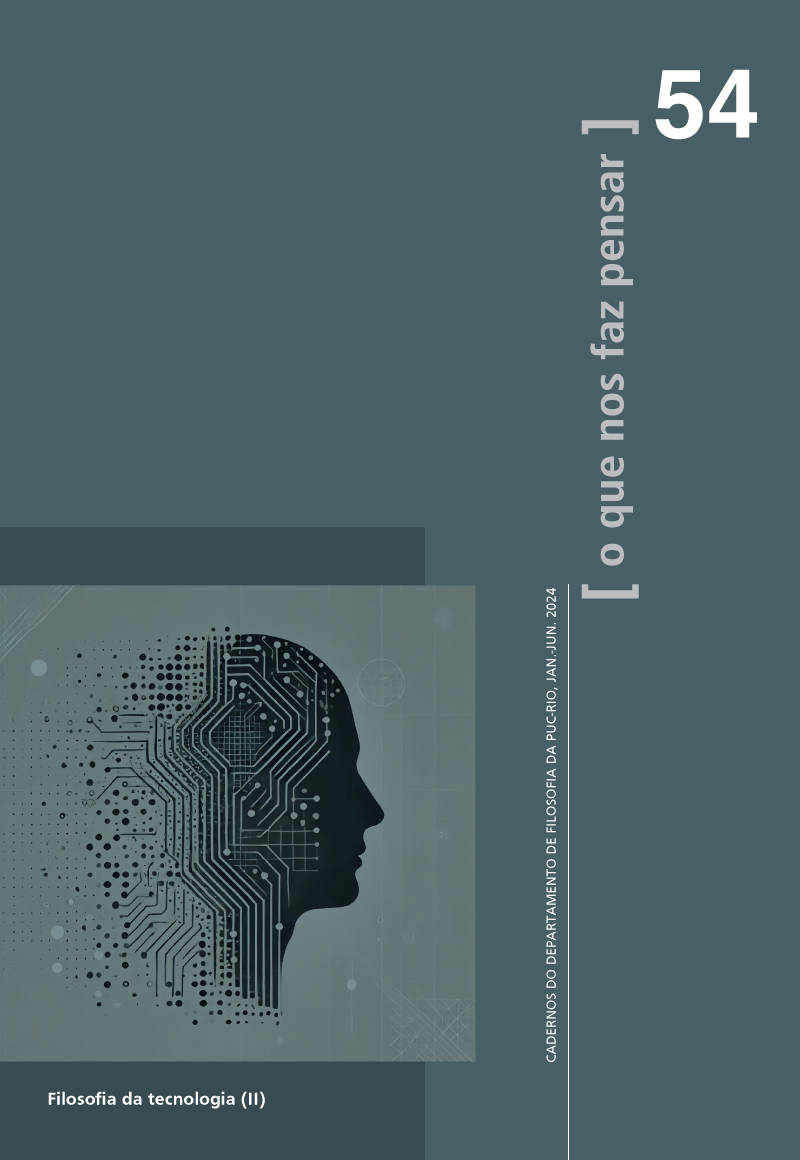Nature and artifice: thoughts on the notions of computer, intelligence and humanity
Main Article Content
Abstract
In this article, we deal with the problem of artificial intelligence from the following
specific formulation: can a computer display intelligence? Our approach to
this question will, deliberately and to a large extent, resort to what we can call
‘caricatures’ - an expressive resource that, although known to portray towards
the grotesque, is often effective in emphasising some aspect of what is portrayed according to the purposes of the portraitist. Employing this type of device, we will offer, by way of starting points, characterisations of a paradigmatic intelligence model and also of what a computer is. Based on these, we will discuss three possible reactions to the aforementioned formulation: the first, negative and representative of an attitude that could be called orthodox; the second, positive, inspired by philosophical contributions of Turing and Wittgenstein; and the third, dissolutive, driven by thoughts aligned with Gadamer’s philosophical hermeneutics.
Article Details

This work is licensed under a Creative Commons Attribution-NonCommercial 4.0 International License.
Copyright Notice
The author of the article or book reviews submitted and approved for publication authorizes the editors to reproduce it and publish it in the journal O que nos faz pensar, with the terms “reproduction” and “publication” being understood in accordance with the definitions of the Creative Commons Attribution-NonCommercial 4.0 International license. The article or book reviews may be accessed both via the World Wide Web – Internet (WWW – Internet), and in printed form, its being permitted, free of charge, to consult and reproduce the text for the personal use of whoever consults it. This authorization of publication has no time limit, with the editors of the journal O que nos faz pensar being responsible for maintaining the identification of the author of the article.
References
DE CASTRO ALVES, T. Towards an evaluation of the normalisation thesis on identity of proofs: the case of the Church-Turing thesis as touchstone. Manuscrito – Rev. Int. Fil. Campinas, v. 43, n. 3, p. 114-163, Jul.-Sep. 2020.
DE LAS CASAS, B. Tratado de Indias y El Doctor Sepúlveda, In: Fuentes para la Historia Colonial de Venezuela. Caracas, 1962.
DESCARTES, R. Discurso do método. In: Coleção Os pensadores, vol. XV., Trad. J. Guinsburg e Bento Prado Jr.. São Paulo: Abril Cultural, 1973, p. 33-80.
DESCARTES, R. Meditações concernentes à primeira filosofia. In: Coleção Os pensadores, vol. XV., Trad. J. Guinsburg e Bento Prado Jr. São Paulo: Abril Cultural, 1973. p. 80-222.
DE SOUZA, C. S. Reflexões sobre Semiótica, Linguagem, Ontologia e Computação. EMAPS-Notas #02. Rio de Janeiro, RJ - Brasil: SERG, Departamento de Informática, PUC-Rio, 2023.
FLEMING, M. Gadamer’s Conversation Does the Other Have a Say?. In: Code, L. Feminist Interpretations of Gadamer. University Park: Pennsylvania State University Press, 2003.
FIUMARA, G. The Development of Hermeneutic Prospects. In: Code, L. Feminist Interpretations of Gadamer. University Park: Pennsylvania State University Press, 2003.
GADAMER, H.-G. Verdade e Método. Tradução de Flávio Paulo Meurer. Petrópolis, Vozes; Bragança Paulista, SP: Editora Universitária São Francisco, 1997.
GADAMER, H.-G. Verdade e método II. Tradução de Enio Paulo Giachini; revisão da tradução de Márcia Sá Cavalcante Schuback. Petrópolis, Vozes; Bragança Paulista, SP: Editora Universitária São Francisco, 2002.
LEIBNIZ, G. Monadologia. In: Coleção Os Pensadores, v. XIX, Trad. M. S. Chauí Berlinck. São Paulo: Abril Cultural, 1974, p. 61-73.
OPPY, G. e DOWE, D. The Turing Test, The Stanford Encyclopedia of Philosophy (Winter 2021 Edition), Edward N. Zalta (ed.) Disponível em https://plato.stanford.edu/archives/win2021/entries/turing-test/ 2021. Acesso em 10 mai. 2024.
PALMEIRO, T. Informática: representações sem exterioridade. Manuscrito não publicado, 2023.
SEARLE, J. Minds, Brains and Programs, Behavioral and Brain Sciences, 3: 417–57, 1980.
SEARLE, J. The Chinese Room, in R.A. Wilson and F. Keil (eds.), The MIT Encyclopedia of the Cognitive Sciences, Cambridge, MA: MIT Press, 1999.
SEARLE, J. Why Dualism (and Materialism) Fail to Account for Consciousness, in Richard E. Lee (ed.), Questioning Nineteenth Century Assumptions about Knowledge (III: Dualism), New York: SUNY Press, 2010.)
SEPÚLVEDA, J. G. Democrates Alter de Justis Belli Causis Apud Indios. Edição bilingue latim-espanhol: Tratado Sobre las Justas Causas de la Guerra contra los Indios. México, Fondo de Cultura Económica, 1987.
TURING, Alan M. On Computable Numbers, with an Application to the Entscheidungsproblem, Proceedings of the London Mathematical Society, second series, 42(1): 230–265, 1936.
TURING, A. Computing Machinery and Intelligence, Mind, 59(236): 433–460, 1950.
TURING, A. Programmers’ Handbook for Manchester Electronic Computer Mark II, Computing Machine Laboratory, University of Manchester, 1950.
WITTGENSTEIN, L. Investigações filosóficas. In: Coleção Os Pensadores, v. XLVI. Trad. J. C. Bruni. São Paulo: Abril Cultural, 1975.

